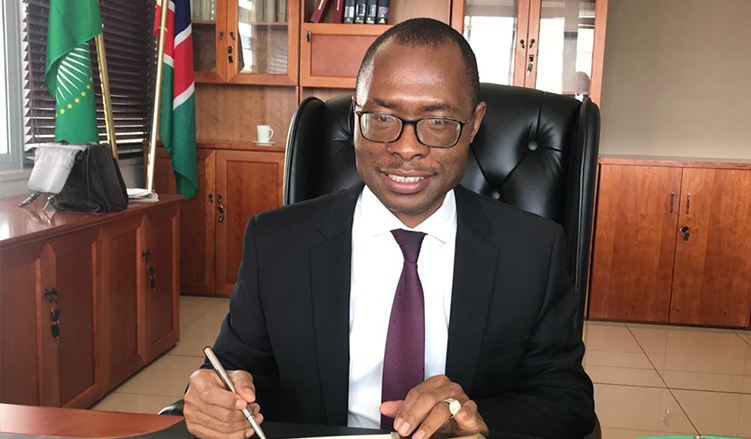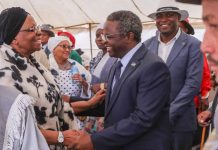
By Tileni Mongudhi and Mathias Haufiku | 23 April 2020
NEW finance minister Iipumbu Shiimi has developed a reputation of shunning the perks of power and being a competent technocrat.
An advocate of doing more with less, Shiimi rejected a new Mercedes-Benz and claiming travel allowances when he was governor of the Bank of Namibia, an indication of his belief in backing words with actions, a former colleague says.
At 50, he has quietly racked up an impressive 25-year career at the central bank backed by a string of academic qualifications.
Some political observers believe his biggest test could be saying no to politicians who might want to cash in on the type of money-making schemes that have left Namibia’s economy languishing in the gutter.
“Will he stand up for what is right?” asked one central banker The Namibian spoke to.
He wondered whether the minister’s previous involvement in ruling Swapo party structures, such as its think tank, would make him well disposed to the party.
Shiimi says it is his life’s purpose to make a difference in the lives of Namibians.
“Therefore, in any moment of choice I will always strive to choose public interest over personal or individual interests. This is also what my president expects of me,” he said last week.
TERRITORY
A senior official who worked closely with Shiimi said the new finance minister is capable of stemming the economic free fall of the past few years.
However, he questioned whether the fiscus building will offer Shiimi the right support politically or the capacity to fulfil his mandate.
“At the Bank of Namibia there are certain infrastructure and layers that insulated him, allowing him to deliver. Unfortunately finance is a different environment besieged by people with ulterior motives,” the official said.
Roman Grynberg, an economics lecturer at the University of Namibia, told The Namibian Shiimi has to address the core of Namibia’s economic and financial problems.
“A corrupt, opaque and inefficient system of allocation of resources including land, fisheries, diamonds and government contracts exists and it must change,” he said.
Grynberg said Shiimi should address the question of resource allocation first to restore people’s faith in the government’s economic management.
“Will Shimii do any of this? I do not believe there is any appetite in Cabinet or from the president for such reforms and we will continue along this regrettable path of economic ruin.”
Grynberg believes Shimii “will do as Cabinet and the president tell him. The coronavirus gives us a perfect excuse for inaction on basic reform.”
SME BANK
Shiimi’s time at the central bank was not without hiccups. His handling of the SME Bank, which collapsed and lost N$350 million, proved a contentious issue.
The bank approved the setting up of the SME Bank amid concerns that then partners from Zimbabwe, such as Enoch Kamushinda, had a dubious track record.
Shiimi told The Namibian last weekend he and his team performed their duties with diligence and care during the SME Bank saga.
“As human beings, we may have made some mistakes in the process and for that we apologise, but I believe we have carried out our work with a sense of duty and dedication,” he said.
Shiimi said the courts agreed his team followed the law, hence the central bank’s victory in all legal challenges it faced regarding the SME Bank.
“Unfortunately much of the work we have done in this regard is not known by the public because the law doesn’t allow us to disclose this information to the public,” he said.
In addition to the SME Bank issue, The Namibian reported in January that financial records exposed the business dealings of Isabel dos Santos, the daughter of former Angolan president José Eduardo dos Santos.
Questions were raised over how the Bank of Namibia allowed Bank BIC Namibia, in which she had the largest stake, to operate in Namibia. Documents suggested the BoN gave Dos Santos’ bank the green light without completing due diligence.
Estimates show her companies could have contributed start-up capital of N$170 million to Bank BIC Namibia.
MR GOVERNOR
A key milestone Shiimi’s former Bank of Namibia colleagues credit him with is a currency conversion deal with Angola in 2015.
They said Shiimi’s team came up with the idea as a solution to shore up the country’s depleted foreign reserves.
Problems on Angola’s end with delayed payments, largely because of a liquidity crisis in Angola, meant some perceived the deal as a flop.
Central bankers said allowing Angolans to convert kwanzas into Namibia dollars ensured that Namibia managed to beef up its foreign reserves by US$426 million – to just below N$6 billion – without losing a cent.

VILLAGE WARRIOR
Born in 1970 at Ontana in the Omusati region, Shiimi started working at the Bank of Namibia in 1995. He served as assistant governor from 2006 to 2010, when he took over as governor.
Shiimi rarely uses social media, but his Twitter account hints at one of his key passions: Advocating rural education.
If he is not taking a group photo at Mashare Combined School in Kavango East to motivate pupils, he is attending an awards ceremony at Iipanda Yaamiti Combined School.
Shiimi – who is also headman of Ontana village in the Omusati region – even has a football competition named after him, Iipumbu Shiimi’s Christmas Cup.
Former Windhoek colleagues describes him as a down to earth governor who often chose to walk about two kilometres from the central bank, in the scorching sun, to attend meetings at the finance ministry.
“He uses his own money when on foreign trips,” one said.
Shiimi reportedly refused to use his unlimited Bank of Namibia fuel card and rejected replacing his official Mercedes-Benz.
A STARK INHERITANCE
Statistics on the economy paint a stark picture of the background against which he will have to make tough choices.
To cite a few: More than 360 000 people, or 33,4% of active employable Namibians, are unemployed, according to the Namibia Statistics Agency.
Government’s total debt stood at N$93,1 billion by the end of 2019 – representing 51,2% of gross domestic product, the highest debt as a percentage of GDP since 2015.
Shiimi also takes charge of a treasury that spends more than half of its revenue on public servants’ salaries with a wage bill now at N$58,8 billion.
One of his tweets, dated August 2014, says: “Those of us with a good life in Namibia should know that our fate and that of our children depends on how the majority of our people live.”





